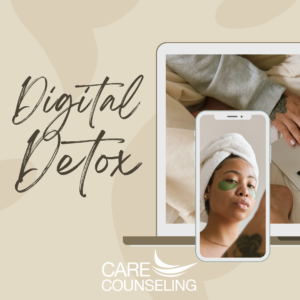Digital Detox
 In today’s hyper-connected world, technology has become an integral part of our daily lives. We rely on smartphones, laptops, and other digital devices for communication, work, entertainment, and information. While these advancements have undoubtedly brought numerous benefits, excessive and uncontrolled technology use can take a toll on our mental health. As the lines between the digital and real worlds blur, it becomes essential to practice a digital detox – a conscious effort to balance technology use and cultivate better mental well-being.
In today’s hyper-connected world, technology has become an integral part of our daily lives. We rely on smartphones, laptops, and other digital devices for communication, work, entertainment, and information. While these advancements have undoubtedly brought numerous benefits, excessive and uncontrolled technology use can take a toll on our mental health. As the lines between the digital and real worlds blur, it becomes essential to practice a digital detox – a conscious effort to balance technology use and cultivate better mental well-being.
Understanding Digital Detox
Digital detox refers to taking intentional breaks from technology, including social media, emails, and other digital distractions. It involves disconnecting from screens and creating space for more meaningful and mindful activities. The goal is to reduce stress, improve focus, and regain a sense of balance in our lives. It does not mean completely abandoning technology but rather establishing healthy boundaries and regaining control over our tech habits.
The Impact of Technology on Mental Health
- Increased Stress and Anxiety
Constant exposure to digital devices can lead to information overload and increased stress levels. The pressure to stay connected and respond to notifications promptly can cause anxiety and a constant state of vigilance. Moreover, social media platforms can contribute to a fear of missing out (FOMO), leading to feelings of inadequacy and isolation.
- Sleep Disruptions
Prolonged exposure to blue light emitted by screens can disrupt our sleep patterns. The use of devices right before bedtime can lead to difficulty falling asleep and reduced sleep quality, resulting in fatigue and irritability the next day.
- Reduced Attention Span
Frequent multitasking and constant digital stimulation can lead to a reduced attention span and difficulties in concentrating on tasks that require sustained focus.
- Social Comparison and Self-Esteem Issues
Social media platforms often foster an environment of comparison, where individuals showcase only the best aspects of their lives. This can lead to feelings of inadequacy and negatively impact self-esteem.
- Physical Health Concerns
Excessive screen time can contribute to sedentary behaviors and various physical health issues, such as eye strain, headaches, and musculoskeletal problems.
The Benefits of Digital Detox for Mental Health
- Reduced Stress and Anxiety
By taking breaks from technology, we can reduce the constant bombardment of information and notifications, leading to decreased stress and anxiety levels. Engaging in offline activities promotes a sense of relaxation and mindfulness.
- Improved Sleep Quality
Implementing a digital detox before bedtime can lead to improved sleep quality. Disconnecting from screens allows our minds to unwind and prepare for restful sleep.
- Enhanced Focus and Productivity
Limiting technology use can improve our ability to focus on tasks, leading to increased productivity and efficiency.
- Increased Real-Life Connections
Digital detoxes encourage face-to-face interactions and strengthen real-life relationships. Spending quality time with loved ones fosters a sense of belonging and emotional well-being.
- Heightened Self-Awareness
Stepping away from the constant comparison on social media allows us to focus on ourselves and fosters a greater sense of self-awareness and self-acceptance.
Tips for a Successful Digital Detox
- Set Clear Boundaries: Establish specific times or days for your digital detox. Start small and gradually increase the duration as you become more comfortable with the practice.
- Create Tech-Free Zones: Designate certain areas in your home or workplace as tech-free zones, such as the dining table or bedroom.
- Disable Notifications: Turn off non-essential notifications to minimize distractions and interruptions.
- Establish Tech-Free Times: Designate certain times of the day as tech-free, such as during meals or an hour before bedtime.
- Engage in Offline Activities: Explore hobbies, outdoor activities, reading, or spending quality time with friends and family during your digital detox.
- Practice Mindfulness: During your digital detox, practice mindfulness techniques, such as meditation or deep breathing exercises, to stay present and centered.
- Plan Digital-Free Getaways: Use vacations as an opportunity to disconnect entirely from technology and immerse yourself in the present moment.
- Be Kind to Yourself: If you find it challenging to adhere to your digital detox plan, be gentle with yourself. It’s okay to have occasional slip-ups; the key is to keep trying.
In the digital age, finding a balance between technology use and mental well-being is crucial for leading a healthy and fulfilling life. By incorporating regular digital detoxes into our routines, we can mitigate the negative impacts of excessive screen time and foster better mental health. Disconnecting from technology allows us to reconnect with ourselves and those around us, leading to a more mindful, present, and emotionally resilient life. Remember, the power to strike this balance lies within each of us; it’s time to take charge of our relationship with technology for the sake of our mental well-being.



























